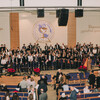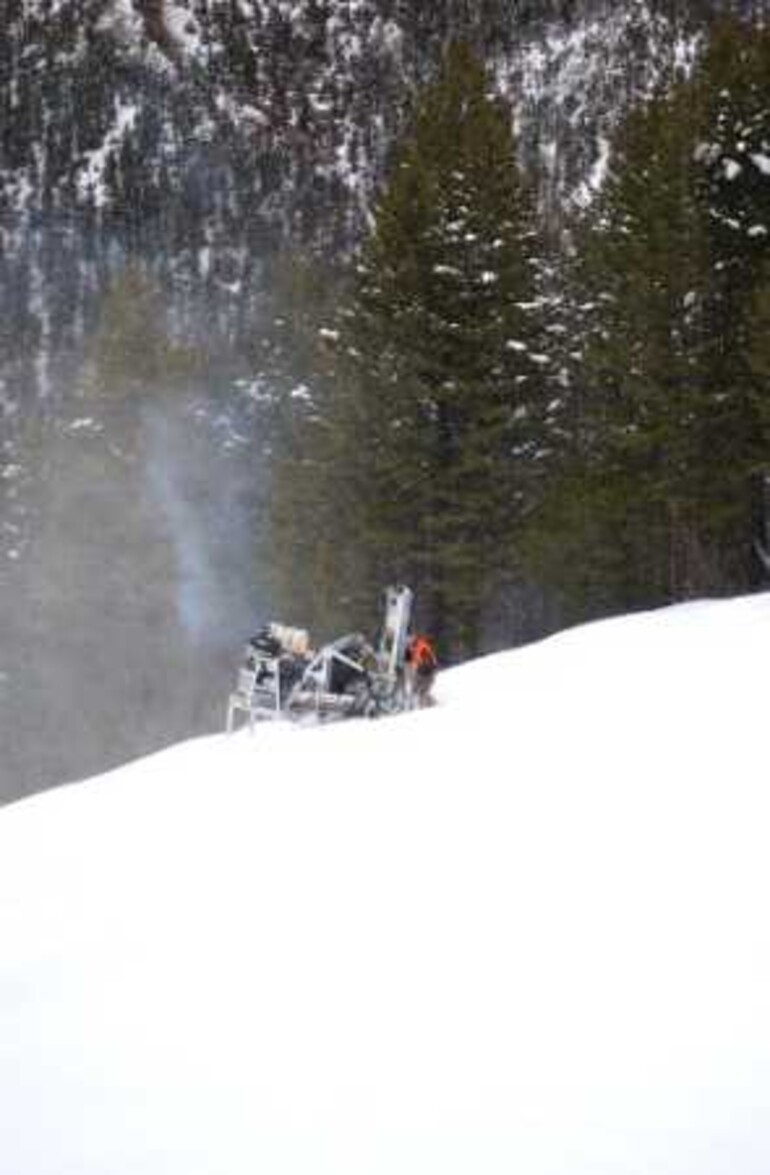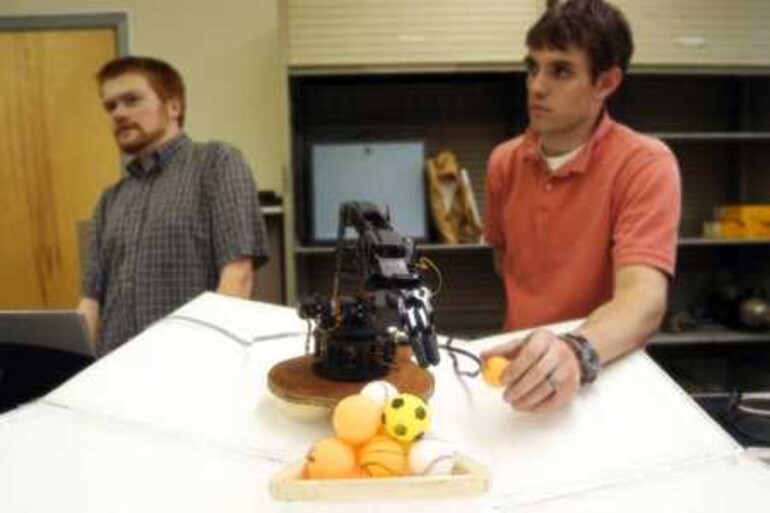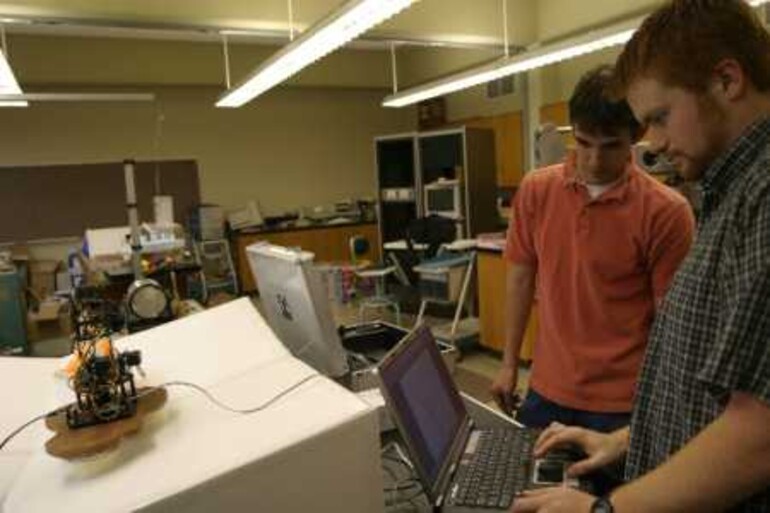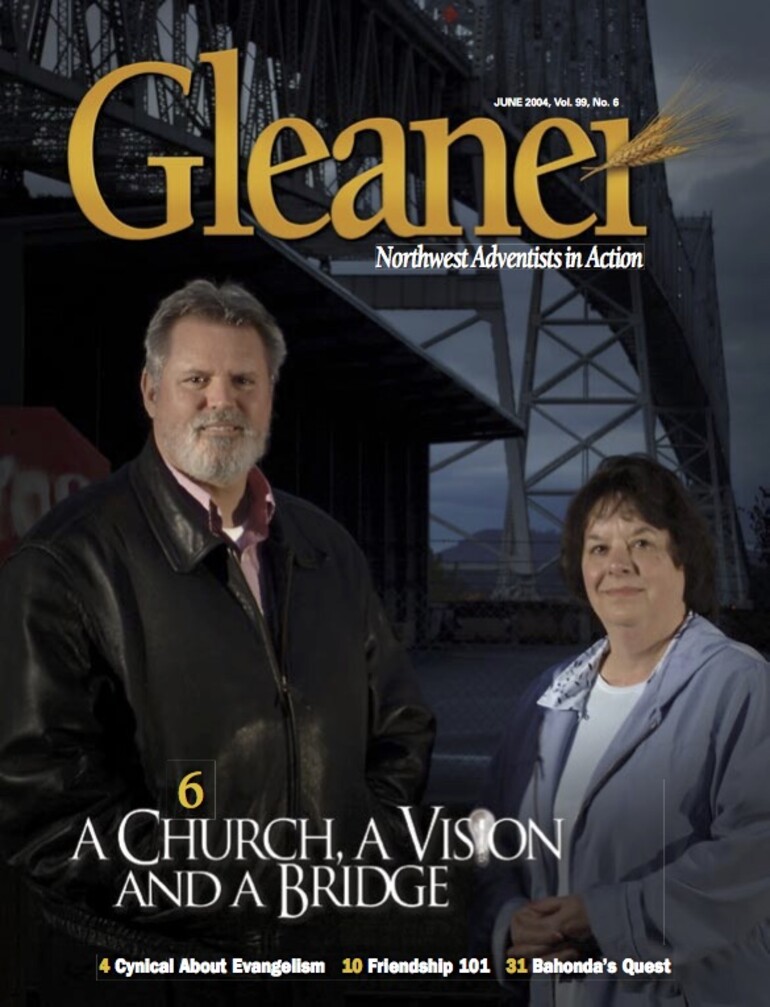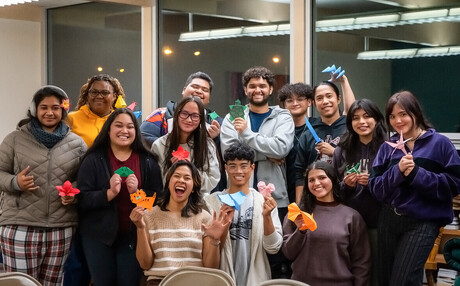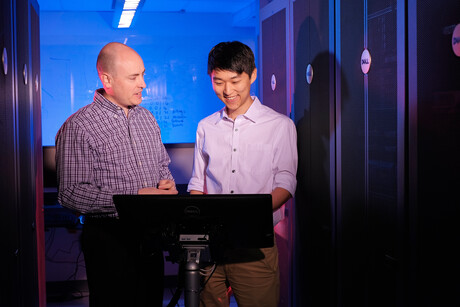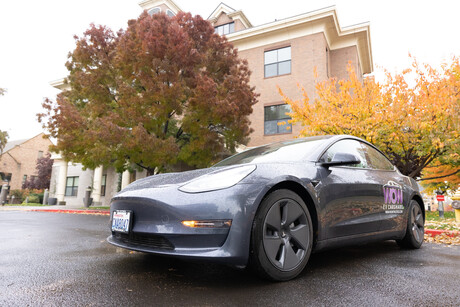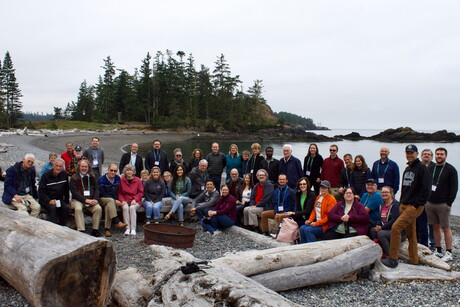WWC Engineering Students Give Award-winning Presentations Last fall, Tom Duffy asked his brother, egineering student Tyler Duffy, to solve a problem. Tom, who owns a drilling company in Montana, asked Tyler to design a drill that could be moved by helicopter to remote locations to test for the presence of oil and natural gas. Sound tough? Not only did Tyler design the drill as his senior project, he also won first place with a presentation of his design at the American Society of Mechanical Engineers (ASME) Old Guard Oral Presentation Competition, which judges an engineer’s ability to deliver oral presentations. He took home $500 as his reward. He is graduating in June with an engineering degree concentrating in mechanical engineering and a major in accounting. Tom Duffy has now put Tyler’s design to good use in his company, Excel Drilling. He has built 12 of the drills at a cost of $25,000 apiece. The heliportable drill is moved efficiently, meaning fewer trips made by the helicopter. Two other WWC students placed second in the competition. Kevin Forsythe and Matthew Barton, both seniors studying mechanical engineering, gave a presentation on the control of a robot they created for their senior project. The robot will become an exhibit at the Walla Walla Children’s Museum, where children will interact with it, controlling it with a joystick to perform tasks, such as picking up and stacking small plastic balls in a balanced pyramid. Forsythe hopes the museum exhibit will expose children to technology by giving them a chance to see it in action. Barton wants the exhibit to open children’s eyes to diverse career options. The ASME competition, held in Richland, Wash., is the precursor for the regional event, the ASME Region 8 Student Conference in Pocatello, Idaho, where 43 colleges and universities compete. The students’ first and second place wins in Richland qualified them to go to the regional competition. Presentations at the regional event are typically scheduled on Sabbath. However, ASME accommodated these students' Sabbath observance, and they were allowed to make their presentations on Friday before a banquet when even more people are in attendance than on Sabbath. “Every year we’ve participated, they’ve been more than happy to accommodate us,” says Donald Riley, associate professor of engineering. “Their accommodations have sometimes worked to our benefit because everybody gets the opportunity to see the quality of projects that our students at WWC are doing. The judges have complimented the School of Engineering at WWC.” The Edward F. Cross School of Engineering at Walla Walla College, founded in 1947, is accredited by the Accreditation Board for Engineering and Technology Inc. (ABET) and has more than 1,000 graduates. The school offers a bachelor of science in engineering with concentrations in civil, computer, electrical and mechanical engineering, and a bachelor of science in bioengineering, an interdisciplinary program with the biology department.
WWC Engineering Students
Give Award-winning Presentations
Last fall, Tom Duffy asked his brother, egineering student Tyler Duffy, to solve a problem. Tom, who owns a drilling company in Montana, asked Tyler to design a drill that could be moved by helicopter to remote locations to test for the presence of oil and natural gas. Sound tough?
Not only did Tyler design the drill as his senior project, he also won first place with a presentation of his design at the American Society of Mechanical Engineers (ASME) Old Guard Oral Presentation Competition, which judges an engineer’s ability to deliver oral presentations. He took home $500 as his reward. He is graduating in June with an engineering degree concentrating in mechanical engineering and a major in accounting.
Tom Duffy has now put Tyler’s design to good use in his company, Excel Drilling. He has built 12 of the drills at a cost of $25,000 apiece. The heliportable drill is moved efficiently, meaning fewer trips made by the helicopter.
Two other WWC students placed second in the competition. Kevin Forsythe and Matthew Barton, both seniors studying mechanical engineering, gave a presentation on the control of a robot they created for their senior project. The robot will become an exhibit at the Walla Walla Children’s Museum, where children will interact with it, controlling it with a joystick to perform tasks, such as picking up and stacking small plastic balls in a balanced pyramid.
Forsythe hopes the museum exhibit will expose children to technology by giving them a chance to see it in action. Barton wants the exhibit to open children’s eyes to diverse career options.
The ASME competition, held in Richland, Wash., is the precursor for the regional event, the ASME Region 8 Student Conference in Pocatello, Idaho, where 43 colleges and universities compete. The students’ first and second place wins in Richland qualified them to go to the regional competition. Presentations at the regional event are typically scheduled on Sabbath. However, ASME accommodated these students' Sabbath observance, and they were allowed to make their presentations on Friday before a banquet when even more people are in attendance than on Sabbath.
“Every year we’ve participated, they’ve been more than happy to accommodate us,” says Donald Riley, associate professor of engineering. “Their accommodations have sometimes worked to our benefit because everybody gets the opportunity to see the quality of projects that our students at WWC are doing. The judges have complimented the School of Engineering at WWC.”
The Edward F. Cross School of Engineering at Walla Walla College, founded in 1947, is accredited by the Accreditation Board for Engineering and Technology Inc. (ABET) and has more than 1,000 graduates. The school offers a bachelor of science in engineering with concentrations in civil, computer, electrical and mechanical engineering, and a bachelor of science in bioengineering, an interdisciplinary program with the biology department.
